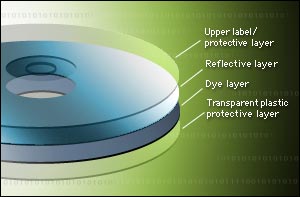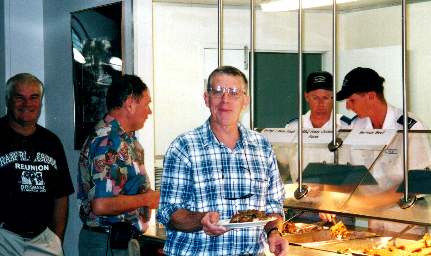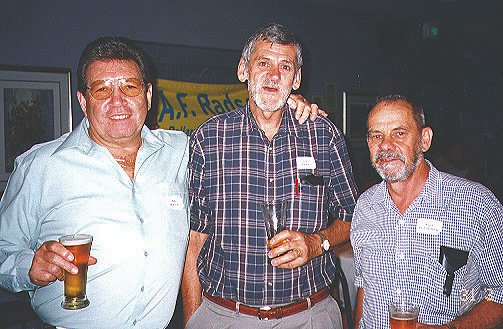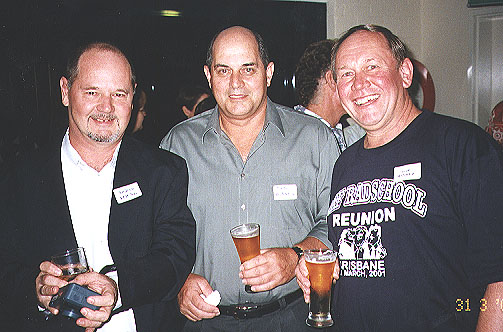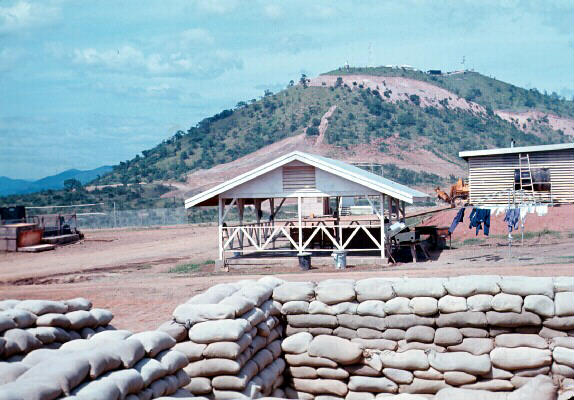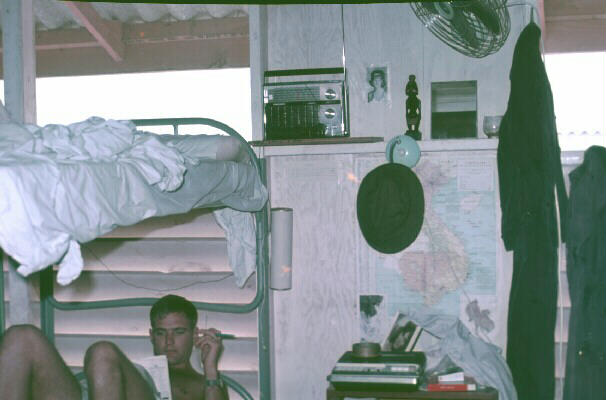|
|
||
|
|
Radschool Newsletter |
Vol 10 Page 8 |
|
|
||
|
Computers and stuff
Sam Houliston.
|
||
|
Caring for your CD’s.
CD’s are delicate things, and in order for you to get years of enjoyment from them (and this includes both audio and data CD’s), you must care for them properly. This means placing them back into their jewel cases whenever you're not using them, not subjecting them to direct sunlight or other extreme weather conditions, and keeping them away from the hands of small children and ham fisted adults.
The storage story: As everyone knows, those jewel cases are not the most robust pieces of equipment, and they nearly always break, and if you’ve got kids, sometimes they just break all by themselves. You can, however, buy replacements from Crazy Clarks, Crazy Clints or other such emporiums, or if you're somewhere you can’t get replacements, paper or plastic sleeves are better than nothing. However, where a jewel case suspends a disc in midair, a paper sleeve is in direct contact with the surface of a disc. Dust can accumulate inside a sleeve, turning it into sandpaper, slowly yet inexorably ruining the surface of your disc.
Downside up: If you're not 100 percent diligent about keeping your discs safely tucked away (who is?), then you should always place them clear side down. The labelled/printed face of a disc is actually more delicate than the bottom, clear, polycarbonate layer, and major damage to the label side will ruin the reflective and dye layers as well. This is not to say that you can scar the clear bottom layer with impunity, but minor scratches to polycarbonate are survivable, and even major ones can often be buffed out or filled.
Label issues: Labels are handy for categorizing your discs, but they can also affect performance and damage your discs. A poorly attached label can cause a disc to wobble too much for high-speed reading (data). If you must use labels, use only those formulated for use on CDs. These have milder adhesives than general-purpose labels and shouldn't react badly with the top layer. If you have to remove a label, be careful. You can peel of both the reflective and dye layers with it making the disk into a pretty drink coaster.
CD marking: Marking a disc with a pen is probably OK if you use a specially formulated CD marker. But the ink formulations in some general-purpose pens can react badly with the upper layer and leak through to harm the reflective and dye layers below. If you want to be completely safe, either mark your discs on the clear inner circle where no data is stored, or better yet, leave the disc unmarked and use the paper jewel case insert to list the disc's contents.
Follow these few simple rules, and you can expect years of service from your CD media.
Searching for Web Sites:
There are millions of search engines on the Internet, and one of the better ones for general web searches is Google. It looks through a couple of billion web sites in a nano-second and faithfully displays what I'm looking for. Sometimes. It does a pretty good job overall, and with a little thinking I can usually adjust my search to make it find what I'm looking for pretty quick. But, How do the search engines work? They have programs called spiders or bots that spend their waking hours scanning web pages. They figure out what each web site is about, based on word frequency, placement, title, keywords, and some other stuff. They save a "score" for each important word in each web site, and they also check for links to other web sites. Sometimes they follow the links and scan new pages, and sometimes they use the number of links to a web site as weighting factors in searches.
For example, if there are a bunch of links to a web site all over the internet, then it must be popular site and a search engine may display it higher on the list. They also use the number of times a link is clicked on for placement weight. Most search engines, with the notable exception of Google, use another weighting factor for search placement -- cash.
How do you get a web site listed on search engines? Most search sites have a "Submit a URL" link you can use to add your site. For example, on google you go to http://google.com/addurl.html. It's free, but there's no guarantee you'll be listed. Other search engines will gladly take your money in exchange for guaranteed listing and placement. Lycos, for example, has a huge box of information on how you can get guaranteed placement in 48 hours, improve your love life, and lose 10kg, all for the low price of $35 + $25 per URL per year.
Next issue—just who were Hewlett and Packard?
|
||
|
Boxing is a bit like a ballet, except there's no music, no choreography and the dancers hit each other. |
||
|
|
||
|
|
||
|
A completely bemused Dave Muir-McCarey (right) after being served in the Airmans’ Mess at Amberley, March 2001—and all for about $4.00. Geoff Mayhew centre trying to decide whether to have the chicken paella or the bacon and mushroom risotto while John Broughton (left) is thinking, “Now if I ran bus-loads of pensioners through here, charged them all $15.00 a head for all they could eat, I’d make a bloody fortune…..” |
||
|
|
||
|
|
||
|
Bob Bocos, Gill Lunn and Keith Fletcher sharing a coldie at the reunion dinner. |
||
|
|
||
|
|
||
|
Fred Young, Bob Maney and Geoff Mayhew at the reunion dinner. These 3 blokes were on 21 Appy and hadn’t see each other since graduation in 1969. |
||
|
|
||
|
Able, Baker, Charlie, Dog.
One of our recent competitions caused a few to get stuck in with a vengeance. Seems not too many agreed with our date for the change over from the old to the new Alfa Bravo Charlie stuff and didn’t waste any time letting us know. We reckoned it was in 1966, but nearly everyone reckoned it was heaps before that. We had a letter from Don Newmann who now lives west of Brisbane and who was on 10Sigs course at Ballarat early in 1954 and he reckons it was in before that and he’s still got his Radschool notebooks to prove it. We got our information from the RAAF’s Power Studies Centre book titled “The RAAF in the War in Vietnam” which on page 21 quotes a Major General John Hartley (Army though) who said that while he was at Holsworthy in 1966 in training prior to heading off to Vietnam, “The phonetic code for radio procedure changed, probably for the first time in about 50 years to Alfa Bravo Charlie”. Fact of the matter is, we really don’t have a bloody clue, but Bob Bocos won’t give the bottle of bubbly back, so it looks like the result will have to stand and the change over date will have to remain one of life’s little mysteries.
The Aussie’s “home” in Phan Rang in the late 60’s. |
||
|
Don also said that from Feb 1969 to Feb 1970 he was in Phan Rang with 2Sqn as an Intelligence Officer where he and two other blokes spent their time in a concrete bunker. He said he and his mates worked a roster where they spent 12 hours on and 24 hours off and they only saw daylight every 3 days.
|
||
|
|
||
|
Peter Jackman, one time RAAF Sumpie, hard at it in Phan Rang back in 67-68. Note the mandatory National R100 “short-wave” receiver on the wall, ideal for keeping up with the news from Radio Aust.. |
||
|
|
||
|
|
||

